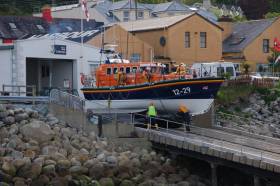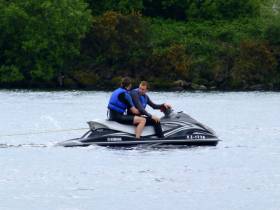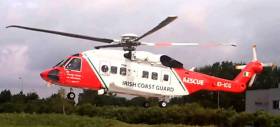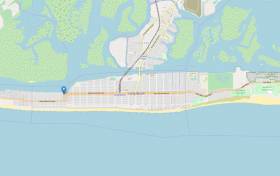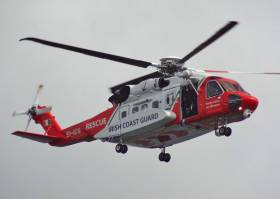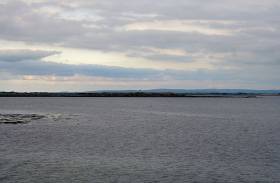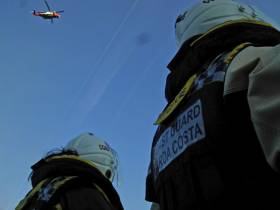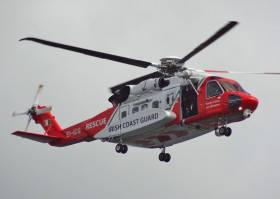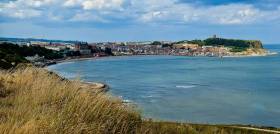Displaying items by tag: missing
Appeal For Woman Reported Missing Near Cliffs Of Moher
A group searching for a woman missing near the Cliffs of Moher has contacted Afloat.ie in an appeal for her whereabouts.
Pauline Walsh was last seen on Tuesday 6 August in the Hag’s Head area in Co Clare, and since then family and friends have been searching the coastline from Black Head to below Doonbeg, the group says.
According to the Irish Mirror, the 54-year-old from Tullamore in Co Offaly is described as five feet seven inches in height, of a medium build, with blue eyes and short blonde hair.
When last seen she was wearing a pink fleece, black tracksuit bottoms and black runners with pink writing and trim.
Anyone sailing or fishing in the relevant areas of Co Clare and Galway Bay who might have any information about Pauline Walsh’s whereabouts is asked to contact the Garda at Tullamore or any Garda station, or call the confidential line at 1800 666 111.
Lifeboats from Clogherhead, Newcastle and Kilkeel were involved in the search for a woman missing in Carlingford Lough at the weekend, which came to a sad end yesterday afternoon (Monday 18 March) with the discovery of a body in the water off Greenore.
Newcastle RNLI was tasked to divert from a morning training exercise on the Co Down coast to join the major search operation which began on Sunday (17 March), concentrating on the entrance to Carlingford Lough and outlying islands.
During this search the all-weather lifeboat located a casualty in the water and, working with volunteer lifeboat crews from Clogherhead and Kilkeel RNLI, the casualty was taken ashore to Greenore Harbour by the Kilkeel lifeboat and placed in the care of An Garda Síochána.
The casualty was shortly after confirmed to be the remains of Ruth Maguire from Newcastle, who went missing during a hen party in Carlingford on Saturday night (16 March).
Speaking following the search, Newcastle RNLI coxswain Nathan Leneghan said: “On behalf of Newcastle RNLI I wish to express our deepest sympathy to the family and friends of the woman who was recovered from the water this afternoon.
“The thoughts and prayers of the everyone involved in the search are with them at this sad time. I also wish to commend the volunteer crews for their commitment and professionalism.”
Kilkeel RNLI lifeboat operations manager John Fisher added: “This was not the outcome we or the family wanted and at this difficult time our thoughts and prayers are with the family and friends of the casualty.
“At this time I would also like to thank the volunteer crew for their commitment and energy. We train for such an incident but always pray that it has a better outcome.”
Body Recovered In Search For Missing Man On Lough Erne
#Missing - A body was recovered yesterday evening (Monday 10 September) in the search for a missing man on Lower Lough Erne, as the Belfast Telegraph reports.
A major search operation was launched in Sunday afternoon after an incident involving a personal watercraft in Muckross Bay.
One man was rescued after swimming to shore but a second had disappeared.
Searches continued into Monday, with the PSNI confirming the body of a man was recovered from the lough later in the day.
“It would appear that what had started out as an exciting afternoon on a jet ski unfortunately has now ended with a fatality,” said Ulster Unionist MLA Rosemary Barton.
The Belfast Telegraph has more on the story HERE.
Search For Missing Man After Personal Watercraft Incident On Lower Lough Erne
#Missing - The PSNI and emergency services launched a major search operation yesterday afternoon (Sunday 9 September) when a man was reported missing after an incident with a personal watercraft on Lower Lough Erne.
According to RTÉ News, one man was rescued after swimming to the shore following the incident in Muckross Bay around 5.30pm.
An RNLI spokesperson said the search for the second individual is ongoing, and involves the PSNI boat and the Irish Coast Guard’s Rescue 118 helicopter from Sligo as well as fire and mountain rescue services.
Elsewhere, The Irish Times reports that a 12-year-old boy was rescued after falling on rocks at Bullock Harbour in Dalkey yesterday afternoon. The child, with a suspected ankle injury, was airlifted to hospital by the Dublin-based coastguard helicopter.
Search Suspended For Limerick Man Missing Off New York Beach
US emergency services have suspended the search for a Limerick man missing after going swimming at a New York beach earlier this week.
As Independent.ie reports, Neil Gibbons, 30, disappeared after he and friends got into difficulty in the water off Long Beach in the early hours of Monday (25 June).
It’s understood that the incident occurred close to where 10-year-old Ramell McRae Jr went missing while swimming last week.
The body of a young boy was recovered in the search for McRae on Monday.
The US Coast Guard announced on Tuesday (26 June) that it has suspended the search for Gibbons “pending any new information”.
Independent.ie has more on the story HERE.
Body Found In Search For Missing Swimmer Off Galway
#Galway - A body was found this morning (Friday 13 April) in the search for a swimmer missing off Salthill in Galway since yesterday.
The Irish Coast Guard’s Shannon-based helicopter Rescue 115 spotted the body on the seabed in shallow water offshore around 10.15am this morning as part of the ongoing search operation.
The body was recovered into Galway RNLI’s inshore lifeboat for transfer to Galway University Hospital. Pending formal identification, the search will be stood down.
Search units involved included An Garda Síochána and Civil Defence teams, and volunteer divers provide by the Irish Underwater Council.
Body Found In Search For Missing Galway Fisherman
#Missing - Emergency responders recovered a body a last night (Thursday 23 November) in the search for a missing fisherman off Galway.
The body was found on the shore in Oranmore Bay, some five nautical miles east of where a fishing boat was discovered adrift yesterday hours into the search.
As previously reported on Afloat.ie, the major air and sea operation was launched after a fisherman was reported missing on Wednesday night.
RTÉ News says the body found last night was brought to University Hospital Galway for a post-mortem examination and identification.
Search Off Galway For Missing Fisherman
#Missing - RTÉ News reports that a major air and sea rescue operation has been launched for a fisherman reported missing off Galway last night (Wednesday 22 November).
A fishing boat was found adrift with no occupant west of Blackrock in Salthill shortly after the search resumed at first light this morning.
RNLI lifeboats from Galway and the Aran Islands are involved in the search with the Shannon-based Irish Coast Guard rescue helicopter in the search, and they have since been joined by local fishing boats.
Search Continues For Sea Angler Missing Off Clare Coast
#Missing - The search continued today (Tuesday 19 September) for a sea angler who was swept into the sea from a popular but treacherous fishing spot near Doonbeg in Co Clare at the weekend.
According to TheJournal.ie, the missing man and a friend, both Russian nationals, had been fishing at Pulleen Bay around 6.30am on Saturday morning (16 September) when he went into the water.
When his friend’s attempt at a rescue was unsuccessful, he is believed to have panicked and driven 60km way to Limerick to raise the alarm.
“This has happened in the past in Clare where non-Irish nationals fishing in very dangerous areas, who have little English or no English … panic and have driven miles upon miles, passed Garda stations and people on the road to raise the alarm,” said local journalist Pat Flynn.
Naval Service divers and local diving clubs have joined a number of Irish Coast Guard units from the area in the search, which has been hampered by poor visibility due to heavy coastal fog.
Meanwhile, as the Clare Herald reports, coastguard search teams expressed their dismay over the weekend as several groups of anglers continued to climb out to the rocky head where the missing man was swept away.
Search Off Scarborough After Crewless Yacht Runs Aground
#Missing - Emergency services are scouring the coastline around Scarborough in north-east England after a yacht with no crew ran aground near the town early this morning (Tuesday 16 May).
According to the Guardian, the yacht, named Don’t Panic and with two on board, left Scarborough around 5.30pm yesterday evening. A local fishing crew reported seeing the boat aground off the West Pier some 11 hours later.
Almost a year ago, the same vessel prompted a warning to fellow sailors over its lack of radio and safety equipment after its skipper telephoned for help over engine failure.




























